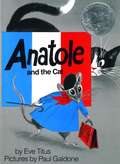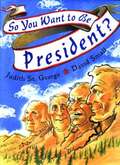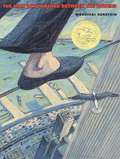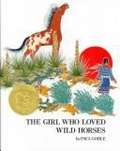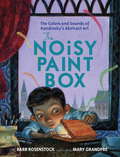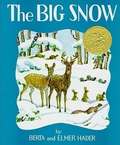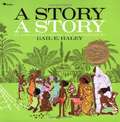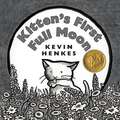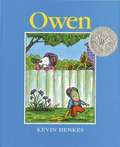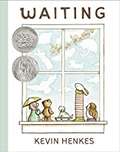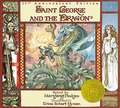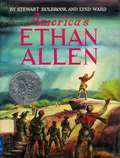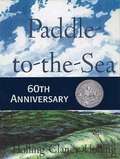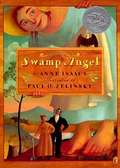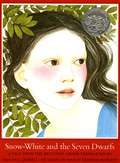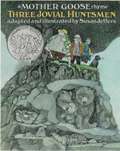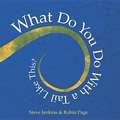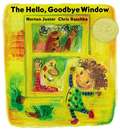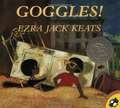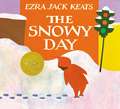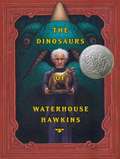Special Collections
Caldecott Award Winners
- Table View
- List View
Anatole and the Cat
by Eve Titus and Paul GaldoneAnatole is the happiest, most contented mouse in all of Paris. He is Vice-President in charge of Cheese Tasting at Duvall's cheese factory. He works in secret at night-- the people at Duvall have no idea their mysterious taster is really a mouse! So M'sieu Duvall thinks nothing of bringing his pet cat to the factory... Clever Anatole must act to protect his job, and his life! He must do what no mouse has done before-- find a way to bell the cat. Bonne chance, Anatole!
So You Want to be President
by Judith St. George
That's a big job, and getting bigger But why not? Presidents have come in just about every variety They've been generals like George Washington and actors like Ronald Reagan; big like William Howard Taft, and small like James Madison; handsome like Franklin Pierce and homely like Abraham Lincoln; They've been born in log cabins like Andrew Jackson and mansions like William Harrison.
[This text is listed as an example that meets Common Core Standards in English language arts in grades 2-3 at http://www.corestandards.org.]
Winner of the 2000 Caldecott Medal
The Man Who Walked Between the Towers
by Mordicai Gerstein
In 1974, as the World Trade Center was being completed, a young French aerialist, Philippe Petit, threw a tightrope between the two towers and spent almost an hour walking, dancing, and performing tricks a quarter of a mile in the sky.
Petit's high wire walk has remained part of the history of New York City and of the World Trade Center. The Man Who Walked Between the Towers captures the poetry and magic of his feat with a poetry of its own: lyrical words and lovely ink and oil paintings that present the detail, the daring, and-in two dramatic foldout spreads-the vertiginous drama of Petit's feat.
Just as the massive towers of the World Trade Center remain in memory, so too does the image of a young man walking in the air between them- here given expression by a master picture book artist.
A Caldecott winner. The book is unpaged.
Mordicai Gerstein is the highly regarded author and illustrator of more than thirty books for children including, most recently, What Charlie Heard, a portrait of the composer Charles Ives.
He lives with his wife, Susan Harris, and their daughter, Risa, in Northampton, Massachusetts.
Winner of the 2004 Caldicot Medal for illustrations.
The Girl Who Loved Wild Horses
by Paul GobleFrom the Book jacket: In simple words and brilliant paintings that sweep and stam pede across his pages, Paul Goble tells of a Native American girl's love of horses. Her people saw that she understood the herd in a special way. The horses would follow her to drink at the river. And in the hot sun she would sleep con tentedly beside them as they grazed among flowers near her village. One day a thunderstorm drove the girl and the horses far from home, and the people were frightened. The girl was lost beneath strange, moonlit cliffs; yet, next morning, she was glad, for a beautiful stallion who was the leader of the wild horses wel comed her to live with them. PAUL GOBLE is in Residence at the Gall Indian and Western Arts at Mt. Rushmore National Memorial in the Black Hills of South Dakota. Among his other books are: THE FRIENDLY WOLF "A young Plains Indian boy and his sister, bored with berry-picking, wander off and become lost. They take overnight shelter in a wolfs den, and, in answer to their pleas for help, the wolf leads them home. Their tribe honors the wolf and declares friendship with the wolf people ... The clear text is complemented by colorful, full-page illustrations which present accurate, richly detailed information about Indian life...A splendid resource for children..." School Library Journal (starred review) LONE BULL'S HORSE RAID "The Plains Indians needed horses for hunting buffalo and hauling their possessions...This story tells of Lone Bull's first horse raid and the battle it led to, which enabled Lone Bull to stand before his people as a warrior. . .Magnificent color illustrations full of rich detail... in this excellently designed, honest portrayal of the Indian point of view." School Library Journal (starred review)
The Noisy Paint Box
by Mary Grandpre and Barb RosenstockVasya Kandinsky was a proper little boy: he studied math and history, he practiced the piano, he sat up straight and was perfectly polite. And when his family sent him to art classes, they expected him to paint pretty houses and flowers--like a proper artist. But as Vasya opened his paint box and began mixing the reds, the yellows, the blues, he heard a strange sound--the swirling colors trilled like an orchestra tuning up for a symphony! And as he grew older, he continued to hear brilliant colors singing and see vibrant sounds dancing. But was Vasya brave enough to put aside his proper still lifes and portraits and paint . . . music? In this exuberant celebration of creativity, Barb Rosenstock and Mary GrandPré tell the fascinating story of Vasily Kandinsky, one of the very first painters of abstract art. Throughout his life, Kandinsky experienced colors as sounds, and sounds as colors--and bold, groundbreaking works burst forth from his noisy paint box. Backmatter includes four paintings by Kandinsky, an author's note, sources, links to websites on synesthesia and abstract art.From the Hardcover edition.
The Big Snow
by Berta Hader and Elmer HaderFrom the book: WHEN the geese begin to fly south, the leaves flutter down from the trees and the cold winds begin to blow from the north, the animals of the woods and meadows, big and small, prepare for the long, cold winter ahead when the countryside is hidden under a deep blanket of snow. They gather food and look for warm, snug places in the ground, trees, caves or thickets, where they can find protection against the icy winds. It might have been hard for the birds and animals of the hillside to survive when the Big Snow came if their good friends, who lived in the little stone house, had not remembered to put food out for them. 1949 Caldecott Medal winner.
A Story, A Story
by Gail E. HaleyMany African stories, whether or not they are about Kwaku Ananse the "spider man," are called, "Spider Stories." This book is about how that came to be. The African storyteller begins: "We do not really mean, we do not really mean that what we are about to say is true. A Story, a story; let it come, let it go." And it tells that long, long ago there were no stories on earth for children to hear. All stories belonged to Nyame, the Sky God.
Ananse, the Spider man, wanted to buy some of these stories, so he spun a web up to the sky and went up to bargain with the Sky God. The price the Sky God asked was Osebo, the leopard of-the- terrible-teeth, Mmboro the hornet who-stings-like-fire, and Mmoatia the fairy whom-men-never-see. How Ananse paid the price is told in a graceful and clever text, with forceful, lovely woodcut illustrations, which have been described.
Winner of the 1971 Caldecott Award.
[This text is listed as an example that meets Common Core Standards for K-1 in English language arts at http://www.corestandards.org.]
Ox-Cart Man
by Donald HallChildren's book about the ox-cart man and his hard work throughout the year.
Kitten's First Full Moon
by Kevin HenkesThe nationally bestselling picture book about a kitten, the moon, and a bowl of milk, written by the celebrated author and illustrator Kevin Henkes, was awarded a Caldecott Medal.
From one of the most celebrated and beloved picture book creators working in the field today comes a memorable new character and a suspenseful adventure just right for reading and sharing at home and in the classroom. It is Kitten's first full moon, and when she sees it she thinks it is a bowl of milk in the sky. And she wants it. Does she get it? Well, no . . . and yes. What a night!
Owen
by Kevin HenkesOwen is attached to his fuzzy yellow blanket--and he won't give it up. But when school starts, Owen's mother knows just what to do.
1994 Caldecott Honor Book.
Waiting
by Kevin HenkesWhat are you waiting for? An owl, a puppy, a bear, a rabbit, and a pig—all toys arranged on a child’s windowsill—wait for marvelous things to happen in this irresistible picture book by the New York Times–bestselling and Caldecott Medalist Kevin Henkes. Five friends sit happily on a windowsill, waiting for something amazing to happen. The owl is waiting for the moon. The pig is waiting for the rain. The bear is waiting for the wind. The puppy is waiting for the snow. And the rabbit is just looking out the window because he likes to wait! What will happen? Will patience win in the end? Or someday will the friends stop waiting and do something unexpected? Waiting is a big part of childhood—waiting in line, waiting to grow up, waiting for something special to happen—but in this book, a child sets the stage and pulls the strings. Timeless, beautiful, and deeply heartfelt, this picture book about imaginative play, the seasons, friendship, and surprises marks a new pinnacle in Caldecott Medalist Kevin Henkes’s extraordinary career. “The short sentences of the text flow with the precision one would expect from a master picture-book creator like Henkes. Little ones, to whom each experience is new, will know what it’s like to dream and wait.”—ALA Booklist
Dave the Potter
by Laban Carrick HillTo us it is just dirt, the ground we walk on... But to Dave it was clay, the plain and basic stuff upon which he formed a life as a slave nearly 200 years ago. Dave was an extraordinary artist, poet, and potter living in South Carolina in the 1800s. He combined his superb artistry with deeply observant poetry, carved onto his pots, transcending the limitations he faced as a slave. In this inspiring and lyrical portrayal, National Book Award nominee Laban Carrick Hill's elegantly simple text and award-winning artist Bryan Collier's resplendent, earth-toned illustrations tell Dave's story, a story rich in history, hope, and long-lasting beauty.
Winner of the Coretta Scott King Medal
Saint George and the Dragon
by Margaret HodgesWinner of the 1985 Caldecott Medal. Set "in the days when monsters and giants and fairy-folk lived in England," this retelling of a classic and well-loved tale recounts the battle between Saint George and the Dragon a creature so huge and fearsome that his tail "swept the land behind him for almost half a mile," and whose "deep jaws gaped wide, showing three rows of iron teeth ready to devour his prey." In graceful and evocative prose, Margaret Hodges retells the dramatic story from Edmund Spenser's Faerie Queene. Trina Schart Hyman portrays the monstrous dragon; the long, horrible battle; and the final victory celebration in exquisite detail, bringing her full artistic genius to bear in this work. Both storyteller and artist have re-created this timeless legend in a book for children of generations to come. MARGARET HODGES first thought of retelling the story of Saint George and the Dragon when a professor of hers mentioned that he had read Spenser's Faerie Queen, to his four year old granddaughter. After Mrs. Hodges saw a reading of the story enacted by puppets, she "became devoted to Saint George" and says that she finds him "everywhere in paintings, sculpture, stained glass, in poetry, and, above all, in legends of many lands. Saint George, it seems, is loved everywhere for his courage and virtue. In Spenser's version the character of Una is equally brave and adventurous." Margaret Hodges is Professor Emeritus in the School of Library and Information Science at the University of Pittsburgh. She has written over twenty books for children and has a special interest in folklore and legends passed down through the oral tradition. TRINA SCHART HYMAN describes herself as "an old-fashioned, traditional kind of illustrator," who welcomed the chance to try out all her romantic ideas on this retelling of Saint George and the Dragon. In the process, she "gained a lot of respect for all her old heroes and their warlike ways," and admits that she was very relieved when the Dragon was finally killed. In the borders of the book, she has painted flowers that are indigenous to the British Isles. Trina Schart Hyman lives in Lyme, New Hampshire, and has illustrated many classic fairy tales for children, including Snow White and The Sleeping Beauty.
One Fine Day
by Nonny HogrogianFrom the book: A delightful telling makes this story of a greedy fox's adventure as catchy as a nursery rhyme. This book was the recipient of the 1972 Caldecott Medal.
America's Ethan Allen
by Stewart H. HolbrookThis book presents the life and legends of Colonel Ethan Allen and Green Mountain boys of the American Revolution.
Paddle-to-the-Sea
by Holling Clancy HollingA young Indian boy carves a little canoe with a figure inside and names him Paddle-to-the-Sea. Paddle's journey, in text and pictures, through the Great Lakes to the Atlantic Ocean provides an excellent geographic and historical picture of the region.
Swamp Angel
by Anne Isaacs and Paul O. ZelinskySwamp Angel can lasso a tornado, and drink an entire lake dry. She single-handedly defeats the fearsome bear known as Thundering Tarnation, wrestling him from the top of the Great Smoky Mountains to the bottom of a deep lake.
Caldecott Medal-winning artist Paul O. Zelinsky's stunning folk-art paintings are the perfect match for the irony, exaggeration, and sheer good humor of this original tall tale set on the American frontier.
A Caldecott Honor Book
An ALA Notable Book
A Time magazine Best Book of the Year
A New York Times Best Illustrated Children's Book of the Year
Winner of the Boston Globe/Horn Book Award
A Publishers Weekly Best Book of the Year
Snow-white and the Seven Dwarfs
by Randall JarrellThe story of the most gorgeous girl named Snow-White and her cruel stepmother.
Three Jovial Huntsmen
by Susan JeffersDespite the many animals in the forest, three hunters see only a ship, a house, and a pincushion and find nothing to shoot.
What Do You Do With a Tail Like This?
by Steve JenkinsA nose for digging? Ears for seeing? Eyes that squirt blood? Explore the many amazing things animals can do with their ears, eyes, mouths, noses, feet, and tails in this beautifully illustrated interactive guessing book by Steve Jenkins and Robin Page.
Winner of the Caldecott Honor
What Do You Say, Dear?
by Sesyle JoslinA handbook of etiquette for young ladies and gentlemen to be used as a guide for everyday social behavior. For very small children.
The Hello, Goodbye Window
by Norton JusterFrom the book: The kitchen window at Nana and Poppy's house is, for one little girl, a magic gateway. Everything important happens near it, through it, or beyond it. Told in her voice, her story is both a voyage of discovery and a celebration of the commonplace wonders that define childhood. It is also a love song devoted to that special relationship between grandparents and grandchild. The illustrations in this book look like pictures colored by a child. Pictures are described. This book received the Newberry Award.
Goggles!
by Ezra Jack KeatsTwo boys must outsmart the neighborhood bullies before they can enjoy their new treasure, a pair of lensless motorcycle goggles. Can they do it?
The Snowy Day
by Ezra Jack KeatsNo book has captured the magic and sense of possibility of the first snowfall better than The Snowy Day. Universal in its appeal, the story has become a favorite of millions, as it reveals a child's wonder at a new world, and the hope of capturing and keeping that wonder forever. Images and image descriptions available.
The Dinosaurs of Waterhouse Hawkins
by Barbara KerleyNot until the mid 1800s were dinosaurs heard of in Victorian England. But when artist Waterhouse Hawkins built the first life-size models of dinosaurs in his native England, and later in America, he dazzled the world with his awe-inspiring creations. The author and illustrator present a story of consuming passion, triumph, loss, and a remarkable legacy that lives on today. Full-color illustrations.
